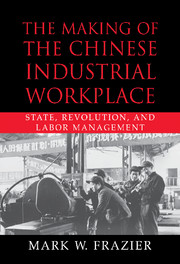Book contents
- Frontmatter
- Contents
- List of Tables
- List of Acronyms
- Preface
- 1 Introduction
- 2 Labor Management and Its Opponents, 1927–1937
- 3 Welfare and Wages in Wartime
- 4 Takeover Policies and Labor Politics, 1949–1952
- 5 Adjusting to the Command Economy
- 6 Enterprise Perspectives on the Command Economy
- 7 The Rise of “Party Committee Factories”
- 8 Conclusion
- Archives Consulted
- Bibliography
- Index
7 - The Rise of “Party Committee Factories”
Published online by Cambridge University Press: 15 December 2009
- Frontmatter
- Contents
- List of Tables
- List of Acronyms
- Preface
- 1 Introduction
- 2 Labor Management and Its Opponents, 1927–1937
- 3 Welfare and Wages in Wartime
- 4 Takeover Policies and Labor Politics, 1949–1952
- 5 Adjusting to the Command Economy
- 6 Enterprise Perspectives on the Command Economy
- 7 The Rise of “Party Committee Factories”
- 8 Conclusion
- Archives Consulted
- Bibliography
- Index
Summary
Why is it that many industrial enterprises have not been able to break away from old bonds in the systems and methods of management?
editorial, Renmin Ribao (People's Daily), 1965.China's transition to a command economy in the 1950s created administrative relationships that in effect pulled state industrial enterprises in two directions. Centralized, “vertical” relations emerged as enterprise managers received investment and inputs from, and submitted profits to, central government ministries and commissions in the State Council. At the same time, localized or horizontal relations also developed as municipal and provincial committees of the CCP claimed administrative authority over enterprises within their territorial “jurisdictions.” While local party committees had no legal claim to do so, they frequently usurped managerial prerogatives over wages, bonuses, and other labor management issues. These competing central and local claims on enterprise labor management generated growing tensions over the distribution of jobs, wages, and enterprise welfare benefits. Complicating matters, for central government agencies at least, was the fact that its personnel and departments oversaw by 1957 a total of 58,000 state-owned enterprises and 112,000 jointly owned enterprises, representing an increase of 200 percent from 1955. As the number of industrial enterprises and the administrative burdens to manage them increased, pressure mounted for local authorities to assert greater control over local industry.
The ambiguous lines of authority between the central government departments and local party committees shifted rather suddenly, and decisively, in favor of the latter by late 1957.
- Type
- Chapter
- Information
- The Making of the Chinese Industrial WorkplaceState, Revolution, and Labor Management, pp. 196 - 233Publisher: Cambridge University PressPrint publication year: 2002

